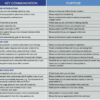Strategies for Success in Risk-Based Payment Models

Risk-based payment models are becoming increasingly common in healthcare. Programs and initiatives such as Medicare Advantage, accountable care organizations (ACOs), and bundled payments are tasking hospitals, physicians, post-acute, and other providers with better managing patient care to improve outcomes and lower costs.
According to the Kaiser Family Foundation, Medicare Advantage—through which providers accept full risk to treat patients for a fixed annual rate—grew by more than 1 million beneficiaries between March 2014 and March 2015. Today, 31%, or almost one in three Medicare beneficiaries, are enrolled in a Medicare Advantage plan.
The much newer ACO and bundled payment models are also growing quickly. And by the end of 2018, the Department of Health & Human Services would like to move more than 50% of Medicare payments into such models.
According to healthcare intelligence firm Leavitt Partners, in early 2015 there were 744 active ACOs in the U.S., up from just 64 at the same time in 2011. Those organizations, through which providers collaborate to manage the cost and quality of care for a patient population, grew by about 4.5 million covered lives between the beginning of 2014 and 2015, reaching 23.5 million participants.
The somewhat similar Bundled Payment for Care Improvement (BPCI) initiative had more than 2,100 participating providers as of August 2015, including acute-care hospitals, skilled nursing facilities (SNFs), physician group practices, long-term care hospitals, inpatient rehabilitation facilities, and home health agencies working together to assume financial risk for certain episodes of care based upon specific diagnosis-related groups (DRGs).
As this growth continues, hospitalists are uniquely positioned to drive success in risk-based payment models if they can become more “longitudinally” involved in patient care rather than focused solely on inpatient services. That means partnering with providers outside the hospital, extending their own practice beyond the hospital, and leveraging technology.
Partnering outside the Hospital
In a recent series of “On the Horizon” articles in The Hospitalist, Win Whitcomb, MD, MHM, argues that hospitalists hoping to capitalize on savings from the BPCI program must think “beyond the four walls” of the hospital to how they can impact the cost and quality of care in the post-acute setting as well as readmission rates. I couldn’t agree more.
The “buying power” hospitalists wield with their referral patterns puts them in a unique position to influence the quality of care at post-acute facilities, thereby benefiting hospitals and their patients.
Traditionally, a hospitalist discharging a patient to a SNF would not ordinarily recommend a particular facility. They likely would leave the mandated “patient choice” presentation to the case manager. And that presentation normally would consist of a list of facilities in the market, with little to no quality or cost information associated with any of the facilities. This process essentially becomes a roll of the dice as to whether the best facility is chosen for particular patients and their conditions.
Under risk-based payment models, hospitalists should consider working with SNFs to help them develop clinical protocols that reduce costly lengths of stay and hospital readmission rates. In return for improving their efficiency and care, the hospitalists can help increase referrals to those SNFs by designing a process (in partnership with the discharge-planning staff) that will provide information on cost and quality of post-discharge options for patients and families. Given the information, patients and families are much more likely to choose a facility that benefits them and, in turn, benefits the system.
Broaden Your Practice
In addition, hospitalists should consider hiring or designating personnel to help manage patients in a post-discharge environment.






